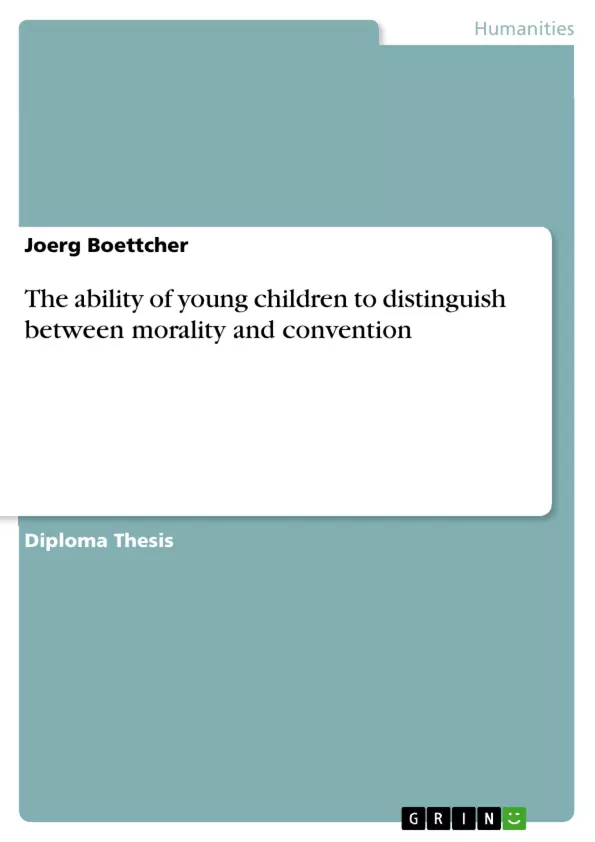In this diploma thesis I want to consider several approaches in the area of moral development research.Given the theory of Lawrence Kohlberg, young children (younger than 10 years of age) seem to stay completely under the constraints of authorities and rules. According to Kohlberg, children’s social judgments and behaviors are determined by instrumental aims to satisfy their own needs and wishes, or to avoid punishment. In this regard, the helping of others or meeting the needs of others is only motivated by instrumental considerations. Thus, in Kohlberg’s view young children are not able to think or to act in a genuinely moral way. In reaction to Kohlberg, other researchers have suggested that young children are capable to make genuinely moral judgments and to act in a moral way. Eisenberg (e.g. 1986) has suggested that young children can have empathic or altruistic feelings which lead them to conduct prosocial acts. Other researchers (e.g. Keller, 1996; Nunner-Winkler, 1993) assert that children under the age of ten years are able to understand and feel moral emotions, which they consider as constitutive or as indicators for morality. Turiel and his associates (e.g. Turiel, 1983) suggest that even children at about 2 years of age are able to differentiate between a moral, conventional, and personal domain of social knowledge, and that children subordinate the importance of personal and conventional rules under the importance of moral rules. These approaches to the morality of young children revealed differing results to differing aspects of morality.
The aim of my work is to examine the above mentioned approaches in order to evaluate the obvious differences between their obtained results and the results of Kohlberg.
My questions are: Is Kohlberg’s approach of using authority dilemmas appropriate to investigate children’s moral reasoning? To what extent do the results of the researchers, who claim an early emergence of morality in children’s development, disprove Kohlberg’s claims of children’s dependency and moral immaturity with regard to authority rules? Where are the boundaries of the presented approaches?
Table of Contents
- Question
- Lawrence Kohlberg's theory of moral development
- The stage model
- Structure, justice and morality
- Investigation and scoring of moral judgments
- Criticism of Kohlberg's theory
- The role of emotions in early morality
- Nancy Eisenberg's investigations of altruistic and prosocial behavior
- The definition of altruistic and prosocial behavior
- General methodology and results
- Conclusions
- Other approaches regarding the relationship of emotions to morality
- Conclusions
- Nancy Eisenberg's investigations of altruistic and prosocial behavior
- Elliot Turiel's concept of social domains
- Definition of the social domains
- Assessment methods and results of the domain research
- Criterion judgments
- Justification categories
- Ratings and rankings
- The acquisition of social knowledge
- Criterion judgments versus familiarity with events
- The relation between seriousness of transgression, criterion judgments, and justification categories
- Emotional consequences of transgressions in social domains
- A first comparison of Turiel's and Kohlberg's assessments and results
- Domain specifities of social judgments and authority concepts
- Domain specifities, mixed domains and moral dilemmas
- Mixed domain events
- Moral conflicts and dilemmas
- Conclusions
- Authority concepts: Differences between legitimacy and obedience
- Conclusions
- Domain specifities, mixed domains and moral dilemmas
- Conclusions
- Emotions
- Dilemma type
- Emotional consequences to moral transgressions
- Domains of social knowledge
- Conflicts
- Justifications
- What one would do and what one should do
- Legitimacy and obedience
- Emotions
Objectives and Key Themes
This diploma thesis aims to investigate the development of moral reasoning in young children (under the age of 10) through an examination of various approaches to morality research. It seeks to evaluate the differences between the findings of these approaches, particularly in relation to Kohlberg's theory.- The ability of young children to make moral judgments and act morally
- The role of emotions in early moral development
- The differentiation between moral, conventional, and personal domains of social knowledge
- The relationship between moral reasoning, authority concepts, and social domains
- The potential to bridge the gap between Kohlberg's approach and other approaches that suggest an early emergence of morality
Chapter Summaries
The thesis starts with a detailed examination of Kohlberg's theory of moral development (Chapter 2), highlighting his stage model, emphasis on structure, justice and morality, and his methods for investigating moral judgments. The chapter also discusses critiques of Kohlberg's theory.
Chapter 3 explores the role of emotions in early morality. It focuses on Eisenberg's research into altruistic and prosocial behavior in children, defining these concepts and outlining her methodology and findings. The chapter also considers other perspectives on the connection between emotions and morality.
Chapter 4 delves into Turiel's concept of social domains, defining the different domains of social knowledge (moral, conventional, and personal) and examining his methods for assessing domain understanding. The chapter also explores the acquisition of social knowledge and the relationship between seriousness of transgression and justifications.
Chapter 5 investigates the domain specificities of social judgments and authority concepts, focusing on the role of mixed domains and moral dilemmas, and the distinction between legitimacy and obedience.
Keywords
The primary focus of this thesis is the development of moral reasoning in young children. The key terms include moral development, early morality, emotional development, social domains, Kohlberg's theory, altruism, prosocial behavior, and authority concepts. The thesis explores various research approaches, including Eisenberg's research on altruism, Turiel's domain theory, and Kohlberg's stage model.
- Arbeit zitieren
- Dipl.-Psych. Joerg Boettcher (Autor:in), 2001, The ability of young children to distinguish between morality and convention, München, GRIN Verlag, https://www.grin.com/document/115961



